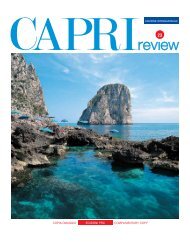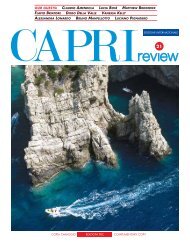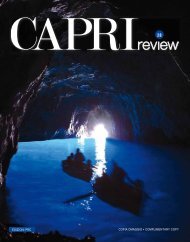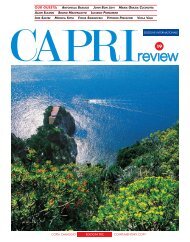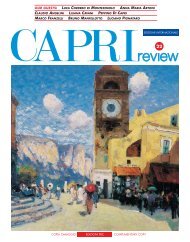You also want an ePaper? Increase the reach of your titles
YUMPU automatically turns print PDFs into web optimized ePapers that Google loves.
32<br />
[Natura]<br />
Non è un caso che tale aspetto, a volte<br />
trascurato dell’isola, sia tornato alla ribalta<br />
in questo anno particolare; ricorre<br />
infatti il bicentenario della nascita di<br />
Charles Darwin.<br />
A ricordarcelo è il Centro caprese Ignazio<br />
Cerio che ha voluto rendere omaggio al<br />
padre della biologia, fondamento di tutte<br />
le scienze della vita, con un incontro su<br />
un tema che dalla metà dell’Ottocento<br />
ha innescato un’aspra disputa scientifica,<br />
“I Faraglioni di <strong>Capri</strong>: un laboratorio<br />
darwiniano”.<br />
Anche se Charles Darwin non vide mai<br />
l’isola, le sue teorie dell’evoluzione fanno<br />
di <strong>Capri</strong> un laboratorio a cielo aperto in<br />
cui domina l’azzurro: è l’azzurro del mare e<br />
del cielo, della grotta e dei fiori, ma è anche<br />
l’azzurro della famosa lucertola caprese.<br />
È così che, esclusiva ed esclusa come la<br />
considerano alcuni, si scopre un aspetto<br />
di <strong>Capri</strong> legato principalmente alla sua dimensione<br />
naturalistica ed esotica. Un’oasi<br />
naturale dove gli studi evolutivi concentrano<br />
la loro attenzione in quanto, sulle isole,<br />
il processo evolutivo delle specie è accelerato<br />
a causa dell’isolamento geografico e<br />
genetico. Per questo, sulle terre circondate<br />
dal mare, gli animali nascono, muoiono e<br />
si modificano più velocemente che sulla<br />
terra ferma.<br />
Ce lo insegnò Darwin, un secolo e mezzo<br />
fa, studiando le Galapagos. Ce lo insegna,<br />
ogni giorno, l’isola di <strong>Capri</strong>. ■<br />
L. ESPOSITO<br />
G. BECHEA<br />
A NATURAL LABORATORY<br />
by Silvia Baldassarre<br />
The Faraglioni, a natural oasis<br />
where the blue lizard lives<br />
We know <strong>Capri</strong> for its history and its<br />
age-old culture that has linked it<br />
through time with figures of great<br />
prestige from the intellectual and artistic<br />
panorama in Italy and the rest of the world.<br />
We have followed, through history, the<br />
footsteps of the emperors of ancient Rome,<br />
the poets and artists, right up to today’s<br />
celebrities from la dolce vita. But there is more<br />
to <strong>Capri</strong> than that.<br />
It is first and foremost a geographical<br />
paradise, nestling in the Mediterranean: the<br />
“queen of the rock” as Neruda called<br />
it, a biological microcosm in which<br />
the processes of evolution have<br />
taken on an exclusive, almost<br />
unique dimension.<br />
It is not by chance that<br />
this sometimes<br />
neglected<br />
aspect of<br />
the island<br />
has come into the limelight again this year in<br />
particular; for it is the bicentenary of the birth<br />
of Charles Darwin.<br />
In commemoration of this, the Ignazio Cerio<br />
Centre on <strong>Capri</strong> has decided to pay homage to<br />
the founding father of biology, the foundation<br />
of all the life sciences, with a seminar on a<br />
topic that has been a trigger for fierce scientific<br />
debate since the middle of the nineteenth<br />
century: “The Faraglioni of <strong>Capri</strong>: a Darwinian<br />
laboratory”.<br />
Even though Charles Darwin never saw the<br />
island, his theories on evolution have made<br />
<strong>Capri</strong> an open air laboratory where blue is the<br />
dominant colour: the blue of the sea and sky,<br />
of the grotto and the flowers, but also the blue<br />
of the famous <strong>Capri</strong> lizard.<br />
That is how we come to discover an aspect<br />
of <strong>Capri</strong>, exclusive and cut off as some see<br />
it, that is linked principally to its natural and<br />
exotic dimension. It is an oasis of nature,<br />
the focus of attention for studies of evolution<br />
because on islands, the evolution of the<br />
species is accelerated as a result of the<br />
geographic and genetic isolation. For this<br />
reason, on land surrounded by sea, animals<br />
are born, die and adapt more quickly than on<br />
the mainland.<br />
Darwin taught us that a century and a half<br />
ago, studying the Galapagos, and the island<br />
of <strong>Capri</strong> teaches it to us every day. ■



